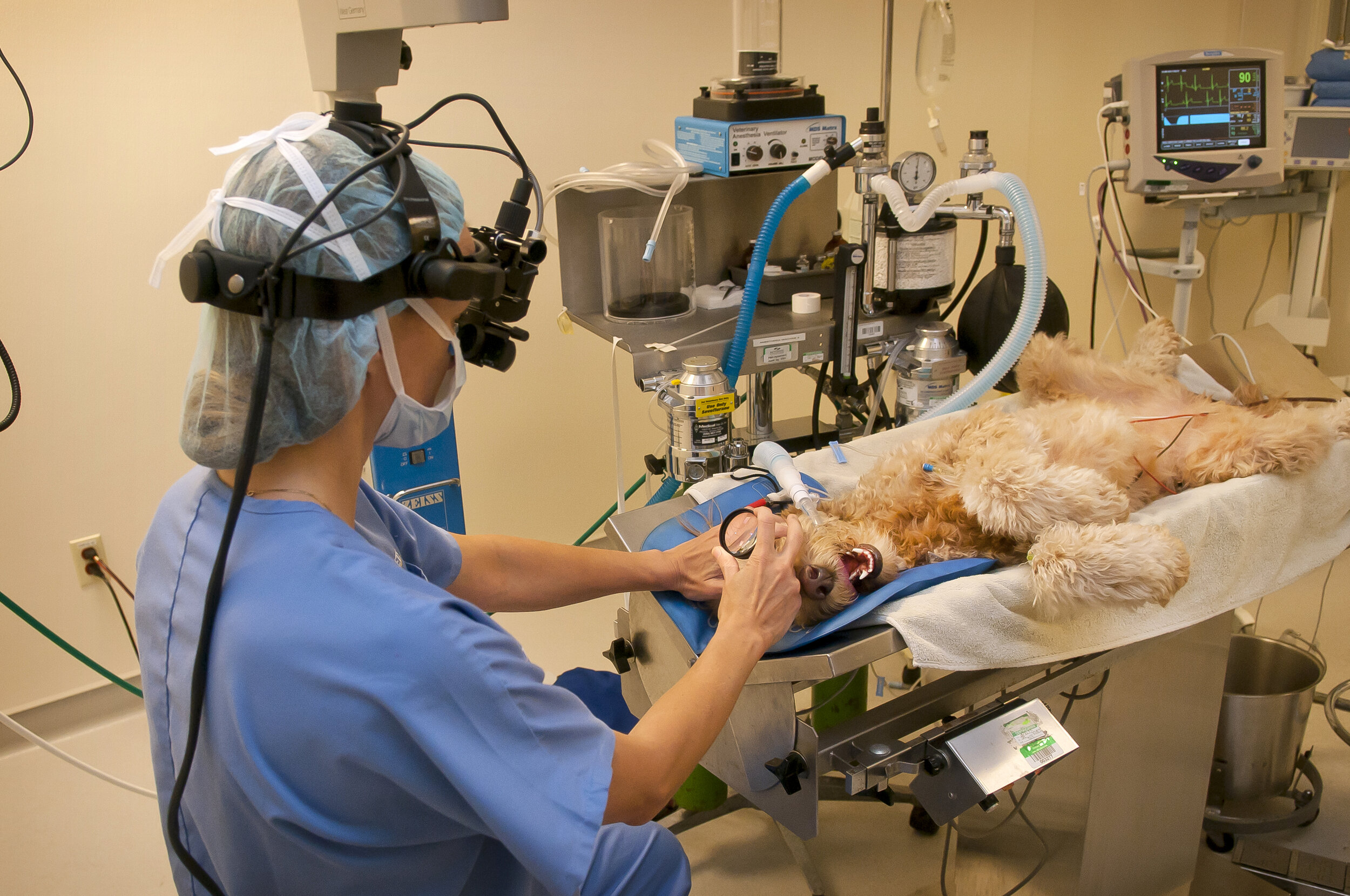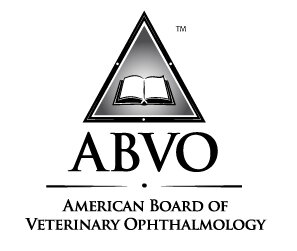Title Use & Definitions
Earning Board Certification as a Diplomate of the ACVO®
What is the ACVO®?
The American College of Veterinary Ophthalmologists® (ACVO®) is an organization, not an actual physical location, that (through the American Board of Veterinary Ophthalmology® or ABVO®) has established certifying criteria for Diplomates of the American College of Veterinary Ophthalmologists (DACVO®) and residents in training to become Diplomates. To become a DACVO®, a person must first graduate from veterinary school, attain a minimum of 12 months full-time clinical practice as a veterinarian, and complete a 3-year or longer residency training program in veterinary ophthalmology under the supervision of at least one DACVO. A number of the resident’s credentials are monitored by committees of the ABVO® before, during, and after the residency training program is completed. The applicant must then submit credentials for approval, if approved permission to take the ABVO certifying examination will be granted. The exam is a multi-day process consisting of multiple written and practical components. After achieving all of these criteria, a veterinarian is recognized as a "Diplomate of the American College of Veterinary Ophthalmologists®" and is board-certified in veterinary ophthalmology. No one may use this title unless they have successfully completed all of these steps.
What is the ABVO®?
The ABVO® is the credentialing arm of the American College of Veterinary Ophthalmologists® (ACVO®). The ABVO® operates under a Charter that was approved by the membership of the ACVO. It functions under the umbrella of the ACVO and thus utilizes the same tax ID number and related associations as the ACVO. Administrative services are managed by the same office staff. The ABVO is charged with submitting a budget for approval annually to the ACVO. It is autonomous in its decision making power, concerning certification of veterinary ophthalmologists.
Certification Requirements
Become a veterinarian.
Have attained the minimum required veterinary experience (currently 48 months; 12 months of which must be prior to residency training).
Have completed or be scheduled to complete an ABVO-approved residency training program by August 1st of the year in which the examination is to be taken.
Be of satisfactory ethical standing.
Have completed and submitted by the deadline all documentation and fees required as part of the credentialing process.
Pass a series of examinations.
Maintain Certification through the MOC program (Diplomates boarded 2015 or later).
Residencies
Tips on how to locate a residency program. For more information about residency programs, please contact the Residency Committee.

Professional Title Use & Definitions
Diplomate of the ACVO® or DACVO®
A person who has completed all of the requirements of the American Board of Veterinary Ophthalmology is board certified in veterinary ophthalmology and recognized as a Diplomate of the American College of Veterinary Ophthalmologists®. This individual may use the certification "DACVO" or "Diplomate, American College of Veterinary Ophthalmologists". Only board-certified persons may call themselves a "veterinary specialist", a "specialist in veterinary ophthalmology" or a “veterinary ophthalmologist". Only Diplomates of the American College of Veterinary Ophthalmologists may conduct OFA, CERF or EERF exams. Additional requirements to be a member in good standing of the ACVO include payment of dues and adherence to the ACVO Code of Ethics.
Resident in Veterinary Ophthalmology
An ABVO®-approved veterinarian serving in an ABVO-approved residency training program in veterinary ophthalmology under the supervision of one or more Diplomates of the American College of Veterinary Ophthalmologists (DACVO®). A veterinarian who has "completed a residency in veterinary ophthalmology" is not a board-certified specialist until they complete all other requirements.
Board-Eligible or Board-Qualified
These designations are not recognized by the ACVO®, the ABVO®, or American Board of Veterinary Specialists (a committee of the American Veterinary Medical Association), and should not be used by veterinary professionals. If someone is seen using this terminology it is being incorrectly used, against procedure, typically to represent a person who has completed their residency training program but has not yet successfully completed the subsequent credentialing and examination requirements necessary to become board-certified. Such veterinarians may not call themselves or imply that they are “veterinary ophthalmologists”, “specialists”, or use the terms “board-eligible or board-qualified”. These individuals may only use the following terminology to describe their credentials, “practice limited to diseases of the animal eye”.
Practice Limited to Diseases of the (Animal) Eye
A person who has successfully completed their residency training program but has not yet successfully completed the subsequent credentialing and examination requirements necessary to become board-certified may state that their practice is limited to diseases of the animal eye. These individuals may not call themselves or imply that they are "veterinary ophthalmologists", "specialists" or use the terminology "board-eligible or board-qualified". All of these phrases are considered confusing and not allowed by the American Board of Veterinary Specialists, the ABVO®, or the ACVO®.
